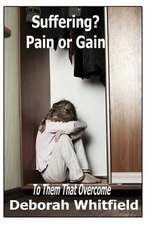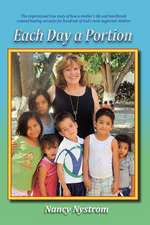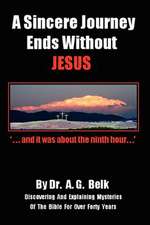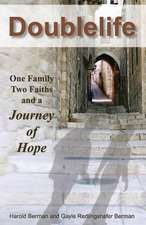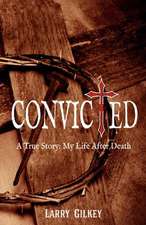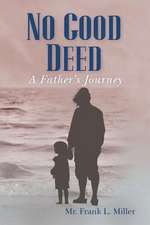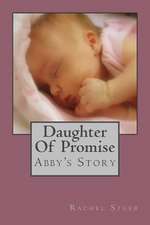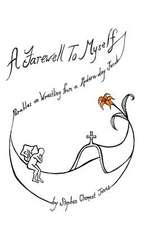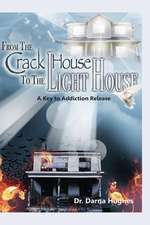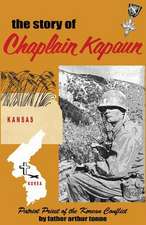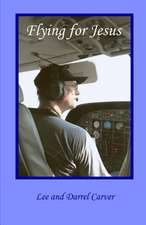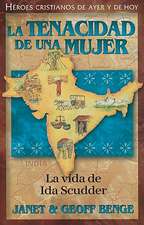To Heaven and Back
Autor Mary C. Nealen Limba Engleză Paperback – oct 2012
Dr Mary Neal, an orthopaedic surgeon, was on a kayaking holiday in Chile. Sceptical of near-death experiences, she was to have her life transformed when her kayak became wedged in rocks at the bottom of a waterfall and she drowned. To Heaven and Back is Mary's faith-enriching story of her spiritual journey, her first hand experience of heaven and its continuing life-enhancing effects.
| Toate formatele și edițiile | Preț | Express |
|---|---|---|
| Paperback (3) | 69.34 lei 3-5 săpt. | +8.07 lei 6-12 zile |
| Authentic Media – oct 2012 | 69.34 lei 3-5 săpt. | +8.07 lei 6-12 zile |
| Waterbrook Press – 31 mai 2012 | 95.70 lei 3-5 săpt. | |
| Random House Large Print Publishing – 31 mai 2012 | 109.95 lei 3-5 săpt. |
Preț: 69.34 lei
Nou
Puncte Express: 104
Preț estimativ în valută:
13.27€ • 13.83$ • 10.99£
13.27€ • 13.83$ • 10.99£
Carte disponibilă
Livrare economică 14-28 martie
Livrare express 27 februarie-05 martie pentru 18.06 lei
Preluare comenzi: 021 569.72.76
Specificații
ISBN-13: 9781780780511
ISBN-10: 1780780516
Pagini: 222
Dimensiuni: 128 x 198 x 20 mm
Greutate: 0.2 kg
Editura: Authentic Media
ISBN-10: 1780780516
Pagini: 222
Dimensiuni: 128 x 198 x 20 mm
Greutate: 0.2 kg
Editura: Authentic Media
Notă biografică
Mary C. Neal, M.D. is an orthopaedic surgeon. She studied at the University of California at Los Angeles School of Medicine, completed her orthopaedic residency at the University of Southern California and is fellowship trained as a spinal surgeon. She is the former Director of Spine Surgery at the University of Southern California and is a founding partner of Orthopedic Associates of Jackson Hole. Her after-life experience has been featured on national media including WGN, Dr. Oz, and Fox and Friends. She has served as a church elder, on several non-profit organization boards, and created the Willie Neal Environmental Awareness Fund. Dr. Neal lives with her family in Jackson Hole, WY.
Extras
Prologue
“The best and most beautiful things in this world cannot be seen or even heard, but must be felt with the heart.” —Helen Keller
God and His angelic messengers are present and active in our world today and this involvement and intervention is both ordinary in its frequency and extraordinary in its occurrence. Despite leading what I would consider a very ordinary life, I have had the privilege of being touched by God in visible and very tangible ways. One of these experiences began on January 14, 1999, when I was vacationing in South America with my husband. While boating, I was pinned underwater in my kayak and drowned. I died and went to heaven. After a brief stay, I was returned to my body. I returned to my earthly life with two shattered legs and severe pulmonary problems. I was hospitalized for more than a month, wheelchair bound for even longer, and did not return to my orthopaedic surgery practice for more than six months.
Many have described my accident as terrible and tragic. I describe it as one of the greatest gifts I have ever received. The series of events surrounding my accident and recovery were nothing short of miraculous. Not only did I have the privilege of experiencing heaven, but I continued to experience the intensity of God’s world and conversed with Jesus several times in the weeks after my return.
Through this experience and conversation, I gained an understanding of many of life’s important questions, such as “What happens when we die?”, “Why are we here?”, and “Why do bad things happen to good people?” I also gained an understanding of the disciple Paul’s statement from 1 Corinthians 13 that of faith, hope, and love, the most enduring is love. I already had reasons to believe in miracles, but taking a journey to heaven and back transformed my faith into knowledge and my hope into reality. My love remained unchanged and everlasting.
One of the several reasons for my return to earth was to tell my story to others and help them find their way back to God. During my initial recovery, I was invited to share my story with small groups in my community and these people shared my story with their friends and family. As it was spread to many parts of the country, I was often told of the profound impact my story made on the lives of the people who heard it. In the process of sharing, I realized that my story does not really belong to me, but to God and is meant to be shared. It has inspired many people, stimulated discussion, and has often resulted in a rejuvenated relationship with God. It has lessened people’s fear of death and increased their passion for living a full and meaningful life. My story has deepened people’s faith and given them hope for the future.
Noblesse Oblige: With Privilege Comes Responsibility
Truly, God does not give us a lamp so we can hide it under a basket or a bed. He gives each of us a lamp so we may give light to the world. Light always dissipates the emptiness of darkness. Ultimately, I felt that if the reading of my story could bring even one person closer to God, it would be worth the writing. Thus, I began to set down on paper an account of my observations and experiences. What I could not have known, and did not know as I worked to complete my manuscript, was that the sense of urgency compelling me to complete it was also God’s hand at work in my life. For the story did not end there…
Introduction
“Hear my cry, O God; listen to my prayer. From the end of the earth I call to you, when my heart is faint. Lead me to the rock that is higher than I.” —Psalm 61:1ߝ2 (NRS)
The tiny two-track road in the remote mountains of Mexico was saturated with rain from the previous night. It was late in the day and we were still several hours from the main road when our dilapidated truck slid off the road and immediately sank into the thick brown mud that formed the shoulder of the road. Our traveling group consisted of the fifteen-year old me, an adult missionary couple, another teenager, and a little baby. Our truck’s spinning wheels were unable to gain traction and the truck quickly sank to its axels. Our anxiety level rose quickly, as we knew that it would be a nearly impossible struggle for us to free the wheels of our truck. It was equally impossible for us to walk far enough to find help. We were not prepared for this sort of delay. The baby would need food and we knew the temperatures would plummet once the sun dipped below the horizon. It was imperative that we get the truck back on the road, as we had driven this desolate stretch of road many times over the summer and had never seen another vehicle. We focused entirely on the task at hand and tried again and again to free the wheels. The depth of the mud seemed to have no limit, and our efforts appeared feeble. As we worked, we began to pray with great fervor and specificity: We prayed that God would “put rock under us,” and soon.
The words had barely floated off our lips when we were shocked to see a rusty old pickup truck rumbling up the road. The driver had taken a wrong turn and was trying to find his way to the main road. When told of our predicament, he graciously offered to give us a ride to town. The cab was too small to hold all of us, so we eagerly climbed into the truck bed and laughingly settled onto his cargo…of rocks. We were filled with joy at the sight of rock, knowing that our prayers had been heard.
Was this an answer to our specific prayers? Did God, albeit with a sense of humor, intervene in our lives and answer our prayers? Was the truck driver an angel or other messenger of God? Was this a miracle? Maybe it was just luck or a coincidence. A coincidence is defined as the “accidental occurrence of events that seem to have a connection.” Luck is a “force that brings good fortune or adversity. It favors chance.” For myself, I call it a miracle: an “event that is considered a work of God.”
The Bible describes many times when angels are sent by God to help those who are in need; often in times of turmoil, life-threatening situations, or at the moment of death. Miracles appear to be universal and are reported by Catholics, Protestants, Muslims, and Hindus. The Quran describes a miracle as the “supernatural intervention in the life of a human being.” The Catholic Church describes miracles as “works of God,” usually with a specific purpose, such as the conversion of a person to the faith. Merriam-Webster’s Collegiate Dictionary defines a miracle as an “extraordinary event manifesting divine intervention.” Cynics claim that miracles defy the laws of nature and, therefore, cannot occur. As described by others who believe as I do, there is a different way to perceive a miracle.
Situation #1
A ball is dropped from a height and falls to the ground.
It obeys the laws of nature.
Situation #2
A ball is dropped from a height and falls toward the ground. A hand reaches out and catches it. It never reaches the ground. The ball has obeyed the laws of nature, but the hand has intervened. If the hand were God’s, we would have witnessed divine intervention without a defiance of the laws of nature.
I believe that God heard our heartfelt cry on that little road in Mexico and chose to intervene
on our behalf. Although the answer was not what we expected, God gave us a specific answer to our specific prayer: He put rock under us.
Over the years, like most people, I have questioned my spirituality. I have wondered about the reality of God, the role of God in my life, wondered why so many bad things are allowed to happen, and wondered about the reality of life after death. Despite these questions and doubts, I witnessed countless numbers of answered prayers and occasions of divine intervention since this high school experience. I drowned while kayaking on a South American vacation and had the great pleasure, privilege, and gift of going to heaven and back. I had the opportunity to converse with angels and ask many questions. I gained much insight. As one result of this adventure, I have also had the opportunity of listening to many other people describe their own spiritual encounters and near-death experiences. Their stories usually begin with their saying, “I’ve never told anyone about this, because I didn’t think they would believe me, but….”
Is God present in our world today? Do miracles still occur? Are there really angels all around us? Does God keep His promises? Is there sufficient reason to live by faith? I believe the answer to each one of these questions is a definitive “yes” and I believe that you will come to this same conclusion as you read about the miracles I have seen and experienced.
Chapter 1, The Early Years
“‘For I know the plans I have for you,’ declares the Lord, ‘plans to prosper you and not to harm you, plans to give you hope and a future.’” —Jeremiah 29:11 (NIV)
I was born and raised in an ordinary Midwestern town in Michigan. I lived in a middle-class neighborhood with my parents, Bob and Betty, two brothers, Rob and Bill, one sister, Betsy, and a small dachshund named Trinka. My father was a general surgeon and my mother was a homemaker. I enjoyed a pleasant childhood which, in some aspects, was idyllic. I did not always have everything I wanted, but never lacked for what I needed. Most importantly for any child, I always felt loved by my family. The creek flowing through the back of our property offered me great excitement and opportunity. I spent many hours in and on that creek; ice skating, boating, fishing, swimming, and exploring.
I learned about snails, slugs, and leeches. I learned what happens when a dog eats the bacon from a fishing hook, and I learned not to look a snapping turtle in the eye. My best friend and I built an elaborate fresh-water clam farm, only to find out later that pearls are made by oysters, not clams. It was great fun and it developed my love for being immersed in the outdoor natural world.
My family attended the local Presbyterian Church, participating in a denomination in which my grandfather, great-grandfather, and great great grandfather had been ordained ministers. Our tall, traditional stone church stood proudly on the town square. While the outside was rather formal and not very inviting, its interior arched toward the sky, beautifully displaying large multicolored stained glass windows. The pews were wellworn and made of a rich and deeply-colored wood. My siblings and I sat through Sunday school and confirmation classes, church services, and the occasional youth group gatherings, but these activities were mechanical and boring to me. Although I willingly attended, these various activities seemed to have little impact on my life.
My brothers and sister and I certainly never developed a relationship with a living, loving God while growing up, and I don’t recall ever being expected to incorporate God or Jesus Christ into my daily life or thoughts. God seemed to be a “Sunday thing” and I do not remember my parents discussing spirituality or religion in our home. In many ways, however, they did model a Christian life for their children. My mother was loving, always supportive, and was an active volunteer in numerous service organizations. My father showed great compassion for those who were less fortunate in their circumstances and he was selfless in his profession as a surgeon.
I would often trail behind my father as he checked on his patients in the hospital or when he was called to the emergency room on weekends. I perceived that his was a life of service, in which he was always kind and respectful to others, was not motivated by money, and always put the feelings and needs of others before his own. As I approached my teenage years, I became more independent and began to hold my own opinions. I discovered that although my father was good at doing activities together, he was not very good at sharing his feelings with me or discussing topics that I considered meaningful or difficult. I adored him in spite of his flaws and was stunned in the spring of 1970 when my parents’ relationship crumbled and my mother asked him to move out of our home.
Divorce was still scandalous at that time and I was outraged when my parents’ divorce became final in the autumn of 1971. I was in the seventh grade and quickly became a confused and angry adolescent. When confronted by their divorce listing in the newspaper, I could no longer deny that my 1950s-esque image of an all-American family had been exploded. During that period, church attendance was one of the few stable aspects of my life.
My two older siblings were already in college and my brother and I continued to live with my mother in our childhood home. Each Sunday morning, my father would drive me to the local greasy spoon for breakfast, then to Church services. I was still embarrassed, and probably angry, about my parents’ divorce, so refused to attend the Presbyterian Church services with him. Instead, we went to the morning service at the local Episcopal Church. We would usually go for a walk after church then return to his apartment to finish the day with a dinner of baked chicken and green beans: the only dinner he ever knew how to make. While I recognized his limitations, I still clung to the fantasy of his returning to my home, and of our family returning to the ideal of my remembered childhood.
My mother was young, attractive, and interesting, so I should not have begrudged her the desire to date, but I did so anyway and tried to disrupt the process in any way possible. Mack was the first guy who was serious about my mom after Dad moved out. One evening when I returned home, I discovered that he managed to eat all of the cookies I had just baked (none of which had been intended for him) and I was furious. I made my opinion clear and I was delighted never to see him again. George was the next man who successfully captured mom’s attention. He was the general manager of the country club where my brothers worked, and they had told him about our mother.
After my brothers persistently nudged him to call, a beautiful courtship developed between George and my mother. Although my parent’s divorce had long been final, I still hated the concept of my mother having a “boyfriend.” To his credit, George was funny, kind, gentle, understanding, and extremely patient. He also gave the best and longest back-scratches known to mankind, which, I might add, was a very successful way to break through my hostility! He loved my mom and he loved her children, so when my mom held a family conference about a year after they started dating and asked for our permission to marry George, it was impossible to deny her that happiness. In my heart, I remained conflicted. George was a decent man, and I thought he would be a reasonable stepfather, but I continued to pray daily for the return of my father and for the return of the life I had known.
Until the very moment in 1973 when the preacher officially declared Mom and George “husband and wife,” I continued to pray that my father would arrive to interrupt the wedding ceremony and reclaim his family. When this didn’t happen, I concluded that God hadn’t listened to my most desperate of prayers and certainly hadn’t answered them. In my disappointment, I discarded the very notion of praying. I was only one very small creature on a planet of more than four billion people; if there really was a God, why should He listen to me or answer my prayers? I decided that my thoughts about an omnipresent God who cares about individuals had likely been a childish and silly belief so I decided to “move on,” leaving my beliefs about God behind me.
I was a smart, accomplished, self-confident fifteen-year old young woman. I thought I knew what was best for me and believed that I was capable of\creating my own future without divine input. What was unrecognizable to me at that time was how God not only had heard my most desperate plea, but answered it in a way that was greater and more fulfilling than I could ever have imagined. Through my mother’s marriage, God gave me a stepfather who was steadfast in his loving, gentle, and gracious manner. George was supportive and respectful. As a parent, he taught me about joy, friendship, and responsibility. He modeled what a loving, respectful marriage looks like, and he became one of the most important influences in my life. God promises that He has plans for us to give us hope and a future and He kept this promise. George coming into my life was definitely not the answer I had prayed for. It was better.
“The best and most beautiful things in this world cannot be seen or even heard, but must be felt with the heart.” —Helen Keller
God and His angelic messengers are present and active in our world today and this involvement and intervention is both ordinary in its frequency and extraordinary in its occurrence. Despite leading what I would consider a very ordinary life, I have had the privilege of being touched by God in visible and very tangible ways. One of these experiences began on January 14, 1999, when I was vacationing in South America with my husband. While boating, I was pinned underwater in my kayak and drowned. I died and went to heaven. After a brief stay, I was returned to my body. I returned to my earthly life with two shattered legs and severe pulmonary problems. I was hospitalized for more than a month, wheelchair bound for even longer, and did not return to my orthopaedic surgery practice for more than six months.
Many have described my accident as terrible and tragic. I describe it as one of the greatest gifts I have ever received. The series of events surrounding my accident and recovery were nothing short of miraculous. Not only did I have the privilege of experiencing heaven, but I continued to experience the intensity of God’s world and conversed with Jesus several times in the weeks after my return.
Through this experience and conversation, I gained an understanding of many of life’s important questions, such as “What happens when we die?”, “Why are we here?”, and “Why do bad things happen to good people?” I also gained an understanding of the disciple Paul’s statement from 1 Corinthians 13 that of faith, hope, and love, the most enduring is love. I already had reasons to believe in miracles, but taking a journey to heaven and back transformed my faith into knowledge and my hope into reality. My love remained unchanged and everlasting.
One of the several reasons for my return to earth was to tell my story to others and help them find their way back to God. During my initial recovery, I was invited to share my story with small groups in my community and these people shared my story with their friends and family. As it was spread to many parts of the country, I was often told of the profound impact my story made on the lives of the people who heard it. In the process of sharing, I realized that my story does not really belong to me, but to God and is meant to be shared. It has inspired many people, stimulated discussion, and has often resulted in a rejuvenated relationship with God. It has lessened people’s fear of death and increased their passion for living a full and meaningful life. My story has deepened people’s faith and given them hope for the future.
Noblesse Oblige: With Privilege Comes Responsibility
Truly, God does not give us a lamp so we can hide it under a basket or a bed. He gives each of us a lamp so we may give light to the world. Light always dissipates the emptiness of darkness. Ultimately, I felt that if the reading of my story could bring even one person closer to God, it would be worth the writing. Thus, I began to set down on paper an account of my observations and experiences. What I could not have known, and did not know as I worked to complete my manuscript, was that the sense of urgency compelling me to complete it was also God’s hand at work in my life. For the story did not end there…
Introduction
“Hear my cry, O God; listen to my prayer. From the end of the earth I call to you, when my heart is faint. Lead me to the rock that is higher than I.” —Psalm 61:1ߝ2 (NRS)
The tiny two-track road in the remote mountains of Mexico was saturated with rain from the previous night. It was late in the day and we were still several hours from the main road when our dilapidated truck slid off the road and immediately sank into the thick brown mud that formed the shoulder of the road. Our traveling group consisted of the fifteen-year old me, an adult missionary couple, another teenager, and a little baby. Our truck’s spinning wheels were unable to gain traction and the truck quickly sank to its axels. Our anxiety level rose quickly, as we knew that it would be a nearly impossible struggle for us to free the wheels of our truck. It was equally impossible for us to walk far enough to find help. We were not prepared for this sort of delay. The baby would need food and we knew the temperatures would plummet once the sun dipped below the horizon. It was imperative that we get the truck back on the road, as we had driven this desolate stretch of road many times over the summer and had never seen another vehicle. We focused entirely on the task at hand and tried again and again to free the wheels. The depth of the mud seemed to have no limit, and our efforts appeared feeble. As we worked, we began to pray with great fervor and specificity: We prayed that God would “put rock under us,” and soon.
The words had barely floated off our lips when we were shocked to see a rusty old pickup truck rumbling up the road. The driver had taken a wrong turn and was trying to find his way to the main road. When told of our predicament, he graciously offered to give us a ride to town. The cab was too small to hold all of us, so we eagerly climbed into the truck bed and laughingly settled onto his cargo…of rocks. We were filled with joy at the sight of rock, knowing that our prayers had been heard.
Was this an answer to our specific prayers? Did God, albeit with a sense of humor, intervene in our lives and answer our prayers? Was the truck driver an angel or other messenger of God? Was this a miracle? Maybe it was just luck or a coincidence. A coincidence is defined as the “accidental occurrence of events that seem to have a connection.” Luck is a “force that brings good fortune or adversity. It favors chance.” For myself, I call it a miracle: an “event that is considered a work of God.”
The Bible describes many times when angels are sent by God to help those who are in need; often in times of turmoil, life-threatening situations, or at the moment of death. Miracles appear to be universal and are reported by Catholics, Protestants, Muslims, and Hindus. The Quran describes a miracle as the “supernatural intervention in the life of a human being.” The Catholic Church describes miracles as “works of God,” usually with a specific purpose, such as the conversion of a person to the faith. Merriam-Webster’s Collegiate Dictionary defines a miracle as an “extraordinary event manifesting divine intervention.” Cynics claim that miracles defy the laws of nature and, therefore, cannot occur. As described by others who believe as I do, there is a different way to perceive a miracle.
Situation #1
A ball is dropped from a height and falls to the ground.
It obeys the laws of nature.
Situation #2
A ball is dropped from a height and falls toward the ground. A hand reaches out and catches it. It never reaches the ground. The ball has obeyed the laws of nature, but the hand has intervened. If the hand were God’s, we would have witnessed divine intervention without a defiance of the laws of nature.
I believe that God heard our heartfelt cry on that little road in Mexico and chose to intervene
on our behalf. Although the answer was not what we expected, God gave us a specific answer to our specific prayer: He put rock under us.
Over the years, like most people, I have questioned my spirituality. I have wondered about the reality of God, the role of God in my life, wondered why so many bad things are allowed to happen, and wondered about the reality of life after death. Despite these questions and doubts, I witnessed countless numbers of answered prayers and occasions of divine intervention since this high school experience. I drowned while kayaking on a South American vacation and had the great pleasure, privilege, and gift of going to heaven and back. I had the opportunity to converse with angels and ask many questions. I gained much insight. As one result of this adventure, I have also had the opportunity of listening to many other people describe their own spiritual encounters and near-death experiences. Their stories usually begin with their saying, “I’ve never told anyone about this, because I didn’t think they would believe me, but….”
Is God present in our world today? Do miracles still occur? Are there really angels all around us? Does God keep His promises? Is there sufficient reason to live by faith? I believe the answer to each one of these questions is a definitive “yes” and I believe that you will come to this same conclusion as you read about the miracles I have seen and experienced.
Chapter 1, The Early Years
“‘For I know the plans I have for you,’ declares the Lord, ‘plans to prosper you and not to harm you, plans to give you hope and a future.’” —Jeremiah 29:11 (NIV)
I was born and raised in an ordinary Midwestern town in Michigan. I lived in a middle-class neighborhood with my parents, Bob and Betty, two brothers, Rob and Bill, one sister, Betsy, and a small dachshund named Trinka. My father was a general surgeon and my mother was a homemaker. I enjoyed a pleasant childhood which, in some aspects, was idyllic. I did not always have everything I wanted, but never lacked for what I needed. Most importantly for any child, I always felt loved by my family. The creek flowing through the back of our property offered me great excitement and opportunity. I spent many hours in and on that creek; ice skating, boating, fishing, swimming, and exploring.
I learned about snails, slugs, and leeches. I learned what happens when a dog eats the bacon from a fishing hook, and I learned not to look a snapping turtle in the eye. My best friend and I built an elaborate fresh-water clam farm, only to find out later that pearls are made by oysters, not clams. It was great fun and it developed my love for being immersed in the outdoor natural world.
My family attended the local Presbyterian Church, participating in a denomination in which my grandfather, great-grandfather, and great great grandfather had been ordained ministers. Our tall, traditional stone church stood proudly on the town square. While the outside was rather formal and not very inviting, its interior arched toward the sky, beautifully displaying large multicolored stained glass windows. The pews were wellworn and made of a rich and deeply-colored wood. My siblings and I sat through Sunday school and confirmation classes, church services, and the occasional youth group gatherings, but these activities were mechanical and boring to me. Although I willingly attended, these various activities seemed to have little impact on my life.
My brothers and sister and I certainly never developed a relationship with a living, loving God while growing up, and I don’t recall ever being expected to incorporate God or Jesus Christ into my daily life or thoughts. God seemed to be a “Sunday thing” and I do not remember my parents discussing spirituality or religion in our home. In many ways, however, they did model a Christian life for their children. My mother was loving, always supportive, and was an active volunteer in numerous service organizations. My father showed great compassion for those who were less fortunate in their circumstances and he was selfless in his profession as a surgeon.
I would often trail behind my father as he checked on his patients in the hospital or when he was called to the emergency room on weekends. I perceived that his was a life of service, in which he was always kind and respectful to others, was not motivated by money, and always put the feelings and needs of others before his own. As I approached my teenage years, I became more independent and began to hold my own opinions. I discovered that although my father was good at doing activities together, he was not very good at sharing his feelings with me or discussing topics that I considered meaningful or difficult. I adored him in spite of his flaws and was stunned in the spring of 1970 when my parents’ relationship crumbled and my mother asked him to move out of our home.
Divorce was still scandalous at that time and I was outraged when my parents’ divorce became final in the autumn of 1971. I was in the seventh grade and quickly became a confused and angry adolescent. When confronted by their divorce listing in the newspaper, I could no longer deny that my 1950s-esque image of an all-American family had been exploded. During that period, church attendance was one of the few stable aspects of my life.
My two older siblings were already in college and my brother and I continued to live with my mother in our childhood home. Each Sunday morning, my father would drive me to the local greasy spoon for breakfast, then to Church services. I was still embarrassed, and probably angry, about my parents’ divorce, so refused to attend the Presbyterian Church services with him. Instead, we went to the morning service at the local Episcopal Church. We would usually go for a walk after church then return to his apartment to finish the day with a dinner of baked chicken and green beans: the only dinner he ever knew how to make. While I recognized his limitations, I still clung to the fantasy of his returning to my home, and of our family returning to the ideal of my remembered childhood.
My mother was young, attractive, and interesting, so I should not have begrudged her the desire to date, but I did so anyway and tried to disrupt the process in any way possible. Mack was the first guy who was serious about my mom after Dad moved out. One evening when I returned home, I discovered that he managed to eat all of the cookies I had just baked (none of which had been intended for him) and I was furious. I made my opinion clear and I was delighted never to see him again. George was the next man who successfully captured mom’s attention. He was the general manager of the country club where my brothers worked, and they had told him about our mother.
After my brothers persistently nudged him to call, a beautiful courtship developed between George and my mother. Although my parent’s divorce had long been final, I still hated the concept of my mother having a “boyfriend.” To his credit, George was funny, kind, gentle, understanding, and extremely patient. He also gave the best and longest back-scratches known to mankind, which, I might add, was a very successful way to break through my hostility! He loved my mom and he loved her children, so when my mom held a family conference about a year after they started dating and asked for our permission to marry George, it was impossible to deny her that happiness. In my heart, I remained conflicted. George was a decent man, and I thought he would be a reasonable stepfather, but I continued to pray daily for the return of my father and for the return of the life I had known.
Until the very moment in 1973 when the preacher officially declared Mom and George “husband and wife,” I continued to pray that my father would arrive to interrupt the wedding ceremony and reclaim his family. When this didn’t happen, I concluded that God hadn’t listened to my most desperate of prayers and certainly hadn’t answered them. In my disappointment, I discarded the very notion of praying. I was only one very small creature on a planet of more than four billion people; if there really was a God, why should He listen to me or answer my prayers? I decided that my thoughts about an omnipresent God who cares about individuals had likely been a childish and silly belief so I decided to “move on,” leaving my beliefs about God behind me.
I was a smart, accomplished, self-confident fifteen-year old young woman. I thought I knew what was best for me and believed that I was capable of\creating my own future without divine input. What was unrecognizable to me at that time was how God not only had heard my most desperate plea, but answered it in a way that was greater and more fulfilling than I could ever have imagined. Through my mother’s marriage, God gave me a stepfather who was steadfast in his loving, gentle, and gracious manner. George was supportive and respectful. As a parent, he taught me about joy, friendship, and responsibility. He modeled what a loving, respectful marriage looks like, and he became one of the most important influences in my life. God promises that He has plans for us to give us hope and a future and He kept this promise. George coming into my life was definitely not the answer I had prayed for. It was better.


